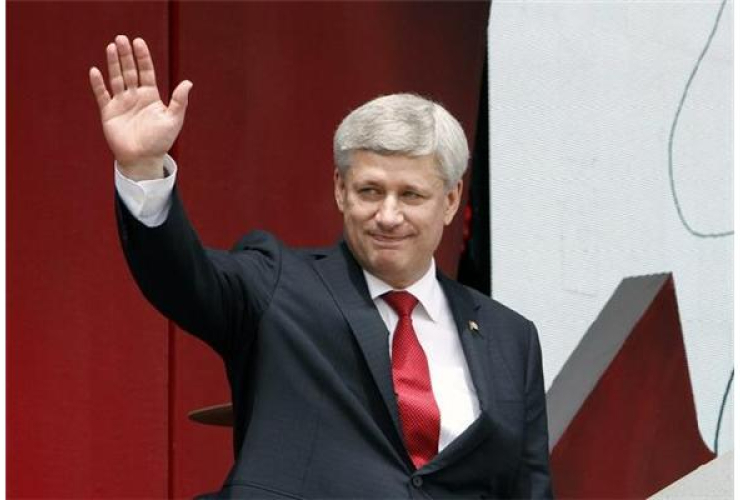OTTAWA — Canada's extraordinarily long 78-day election campaign that culminates Monday was always going to be one for the record books.
Stephen Harper aspires to become the first prime minister since Sir Wilfrid Laurier in 1908 to win four consecutive mandates.
Tom Mulcair still hopes to take the official Opposition NDP over the top to form the first federal New Democratic government in the country's history.
And the Liberals are hoping to make an unprecedented leap from third-party status to government, while reinstalling a Trudeau at 24 Sussex Drive for the first time since Pierre Elliott Trudeau stepped down in 1984 after almost 16 years in office.
Add in the 11-week length of the battle — the longest since the election of 1872 — and a per-party spending limit of a staggering $54 million (far and away the highest ever) and all the ingredients were present for an epic confrontation.
Still, what transpired over the campaign's final weekend is eye-popping.
There was tough-on-crime Harper with his drug-demonizing campaign strategy holding a Saturday night rally in Toronto with former Toronto mayor Rob Ford, the world's most celebrated crack addict of 2014, just as new revelations were published detailing Ford's bizarre and disturbing behaviour while in office.
And there was Justin Trudeau, scion of the late Pierre and his hated national energy program, spending the final day of the race in Edmonton and Calgary while making an electoral pitch to Quebecers and all but trolling Harper's old Alberta-based grassroots.
"It's a message I'm proud to deliver here with a big smile as a Liberal, as a Trudeau and as a Quebecer," Trudeau, 43, told a lively rally in Edmonton before moving on to an even bigger event in Harper's adopted hometown of Calgary.
"People in Quebec need to know that Alberta matters, that our country needs Alberta to succeed," Trudeau said in English and French. "But so too do Quebecers need to be reminded that our country needs them to engage, too."
During a media availability in Calgary, Trudeau made his appeal for national unity in more tangible terms: "I will never use western resources to try to buy eastern votes."
Trudeau, who ended his day in the B.C. riding that was held by his maternal grandfather James Sinclair for 18 years in the 1940s and '50s, was the only leader to take reporters' questions Sunday.
If Trudeau's message was an attempt to bring the country together under a Liberal banner, Harper was flying the flag of fiscal conservatism.
"Voting Conservative means this — no money, no money comes out of your pocket of middle-class Canadians, no money comes out to pay for the tax hikes and the deficits of the Liberal party," an angry and energized Harper said in Newmarket, Ont.
At a later whistle stop in Regina as Harper flew west to B.C., the prime minister warned that a Liberal victory would tear down everything his Conservatives have achieved.
"Today at the federal level, taxes are at their lowest level since John Diefenbaker was the prime minister, their lowest in over 50 years," said Harper, before promising more tax cuts.
"The other guys want to take us back to the days where they could get their hands on as much money as possible and spend it on bureaucracy and special interests. We have been building a Canada over the past few years that they do not like."
In downtown Toronto, Mulcair was left invoking the name of Jack Layton on the late NDP leader's old turf in a last-chance bid to restore New Democrat hopes.
What began Aug. 2 as a tight, three-way race with the NDP in the lead and Liberals trailing appeared to flip on its axis in the final week, with Trudeau's Liberals surfing into election day on a rising wave of public opinion and the New Democrats a distant third in every public opinion poll.
"We're going to get it done," Mulcair maintained at a rally in one of the hotly contested downtown Toronto ridings that remain two-way, NDP-Liberal battles.
Mulcair spent the final few days of the campaign furiously kicking up dust over Liberal transgressions. The resignation of Liberal campaign co-chairman Dan Gagnier, forced to step down Wednesday after The Canadian Press revealed that he was providing strategic advice to TransCanada over the Energy East Pipeline, provided the NDP with a late chance to tarnish Trudeau's halo.
But an even bigger cloud ballooned on Sunday, when Benjamin Perrin, a former lawyer in the Prime Minister's Office who was called as a witness at the fraud, bribery and breach of trust trial of Sen. Mike Duffy, publicly stated: "The current government has lost its moral authority to govern."
Perrin's intervention on the final day of the campaign served to reprise its opening stanza in August, when the ongoing Duffy trial dogged Harper for two weeks.
Bookended between a corruption trial and the campaign's wild finish were debates over Syrian refugees, niqabs, "barbaric cultural practices," a massive new trade pact with Pacific rim countries, deficits versus surpluses, pensions, taxation, child care and public infrastructure.
When Parliament was dissolved for the election, the Conservatives had 159 seats in the 308-seat House of Commons, the NDP had 95 and the Liberals 36.
Thirty new seats have been added this election, including 15 in Ontario, bringing the total to 338 and upping the number of seats needed for a bare majority to 170.
Bruce Cheadle, The Canadian Press



Comments